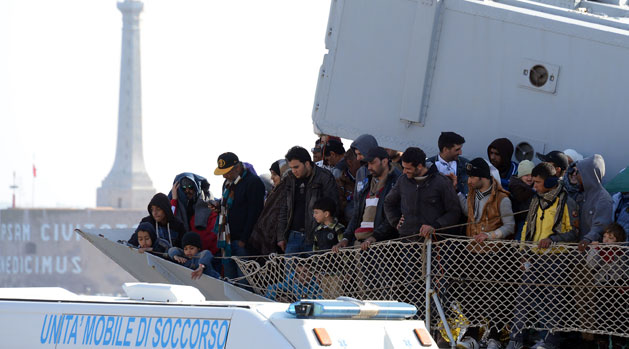Britain vows to fight proposed refugee quotas from Brussels
Mandatory resettlement system to be proposed by the EU Commission in response to the crisis in the Mediterranean

A free daily email with the biggest news stories of the day – and the best features from TheWeek.com
You are now subscribed
Your newsletter sign-up was successful
Brussels is planning to introduce mandatory national quotas for refugees in Europe, in a controversial move that has divided member states.
The proposal comes as thousands of people continue to make the dangerous journey across the Mediterranean to Europe and human rights groups call for an urgent response to the growing humanitarian crisis. More than 60,000 people have attempted to make the journey this year alone and at least 1,800 have died, reports the BBC.
"Some member states have already made a major contribution to [refugee] resettlement efforts. But others offer nothing," the proposal says. The European Commission will also insist that member states open up legal avenues for migrants to enter the EU safely.
The Week
Escape your echo chamber. Get the facts behind the news, plus analysis from multiple perspectives.

Sign up for The Week's Free Newsletters
From our morning news briefing to a weekly Good News Newsletter, get the best of The Week delivered directly to your inbox.
From our morning news briefing to a weekly Good News Newsletter, get the best of The Week delivered directly to your inbox.
The quotas will be applied according to a number of factors, including national wealth levels and unemployment rates, to determine the number of refugees each country should admit.
The plans, which will be unveiled in Brussels this week, are supported by Germany, but are strongly opposed by Britain's new Conservative government. Under the proposal, Britain could be forced to double the number of migrants accepted into the country from 30,000 a year to more than 60,000.
"The UK has a proud history of offering asylum to those who need it most but we do not believe that a mandatory system of resettlement is the answer," a Home Office spokesperson said. "We will oppose any EU Commission proposals to introduce a non-voluntary quota."
The government says it believes that the focus should instead be on stopping the "callous criminals who lie behind the vile trade in human beings".
A free daily email with the biggest news stories of the day – and the best features from TheWeek.com
It is a position likely to put David Cameron on "collision course" German chancellor Angela Merkel and other top EU leaders as he prepares to renegotiate Britain's relationship with Brussels ahead of his planned EU referendum , says The Guardian.
European leaders are due to meet to discuss the proposals at a summit next month.